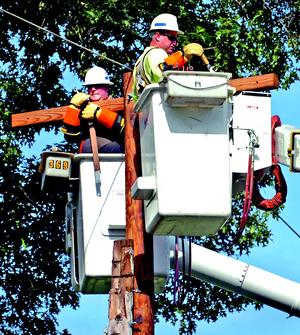
Switching to a municipal electric utility is not that easy

Amelia Kunhardt/The Patriot Ledger
National Grid line workers install a new pole so that electrical lines can be attached and power restored to homes on Birch Road in Pembroke following Tropical Storm Irene.
By Fred Hanson
The Patriot Ledger
Posted Sep 08, 2011
QUINCY — State law effectively gives veto power to privately owned utilities.
For the second time in eight months, the slow response of electric utilities to restoring storm damage has renewed talk among local officials of forming or expanding municipal power companies.
But that would require a change in the state law that effectively gives investor-owned electric companies veto power over such a change.
“It’s impossible today,” to form a municipal electric utility, said Patrick Mehr, who heads the Massachusetts Alliance for Municipal Electric Choice.
The South Shore’s three municipal electric utilities – in Braintree, Hingham and Hull – were all formed in the late 19th century. The newest of the state’s 41 municipal electric companies was created in 1926.
A century-old state law sets up the process for a municipality to acquire a local power system, which begins with two votes approved by a two-thirds majority of the local governing body within a 13-month period.
“It’s a fairly involved process and not one we’ve seen take place in recent memory,” said Lisa Capone, a spokeswoman for the state Department of Energy and Environmental Affairs.
Mehr said that if the municipality and the utility can’t come to an agreement on the price, the utility cannot be required to sell its assets. Rather, the municipality would be required to build an electric system of its own.
“Nobody would want two sets of wires and poles,” he said.
A former official of the French ministry which oversaw the state-run national electric utility, Mehr has been involved in trying to set up a municipal electric utility in Lexington for a decade.
He said legislation that would make it easier for a municipality to acquire the assets of a local utility has been filed in the state Legislature for several years but has met heavy opposition from the investor owned utilities.
Bridgewater Town Manager Troy Clarkson is one who is taking a close look at a change.
“Our level of frustration is such that that we’re reviewing all our options,” Clarkson said.
He and other area officials have harshly criticized National Grid for what they felt was an inadequate response to the snowstorm the day after last Christmas, which also caused widespread power outages.
“We were angry and we were assured it would never happen again. And it did,” he said.
Clarkson said they are working with the town’s state representative, Angelo D’Emilia, R-Bridgewater, on legislation to assist in establishing a municipal electric utility. He knows one thing at the outset.
“It’s expensive,” Clarkson said.
One of of the things that makes a municipal utility attractive to communities is quicker emergency response.
After Tropical Storm Irene struck on Aug. 28, municipal utilities in Braintree, Hingham and Hull had restored electricity to all but about 125 customers by the next day.
In Middleboro and Lakeville, where 80 percent of Middleboro Gas and Electric’s 15,000 electric customers lost power at the height of the storm, all had it back by Thursday, four days after the storm.
It took a week to restore service to all customers of National Grid.
Officials of the investor-owned utilities say the comparisons are unfair since they are responsible for larger areas and more customers.
But Mehr said the municipal utilities have 50 percent more line workers per customer than their investor-owned counterparts.
State Sen. Robert Hedlund, R-Weymouth, has called for hearings on the investor-owned utilities response to Irene, especially the lack of information provided to customers. Hedlund said he would like to change the law to allow municipal utilities to sell power in other communities.
Fred Hanson may be reached at fhanson@ledger.com.
